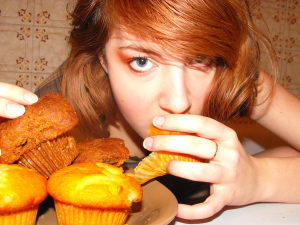
By zernova via deviantart.com
One common issue with overboard eating is emotional eating. This type of eating may affect the results on the scale, but it all begins in the mind.
Emotional Trigger => Comforting but Unhealthy Eating Choice
Everyone has good days and bad days. How we deal with the bad ones brings emotional eating into play. You look for comfort for your emotional pain. People who turn to food for comfort find a coping mechanism that won’t judge them, hurt them or tell them “no.” To complicate this issue, eating pleasurable foods can stimulate the release of endorphins, just like smiling, laughing and exercise. Endorphins are “feel good” chemicals that are released into our brains. Therefore, after you eat, you feel better.
Emotional eaters use food to relieve stress. They hide behind the food instead of seeking solutions to the problems. This is not uncommon when the stressor is something horrible such as physical abuse or a death. But the trigger can be anything that causes mental discomfort, from overwhelming to things not going according to plan.
But, how do you know you are using food as a crutch?
The first sign is obvious: You will gain weight if you eat too much. In light of the weight gain, examine other areas of your life:
- Have you been under stress lately at work or at home?
- Has anything traumatic happened in the last year?
- Are you dealing with a problem but haven’t found a solution?
Answering “yes” to any of these questions could mean that your weight gain is, at least in part, caused by emotional eating. You eat but you are not necessarily hungry at the time. The foods that you choose are what we term “comfort foods.” They are different for each person because comfort food is often associated with a pleasant memory. However, there are some common qualities of comfort food across the board. Comfort foods often:
- Are high in fat, such as French fries, fried foods, etc.
- Are high in carbs, like macaroni and cheese, mashed potatoes, etc.
- Are high is sugar content, such as ice cream, donuts, cookies, cake, etc.
What can you do to curb emotional eating? The first step is recognizing that you have a problem. You may experience feelings of helplessness and guilt. The guilt is over potentially ruining your health or sabotaging your weight loss efforts, and the helplessness lies in the fact that you don’t see a way out.
Once you recognized the problem, seek help. There are many types of counselors and coaches out there that can help you with emotional eating. This unhealthy habit has nothing to do with dieting or changing your eating habits. It has everything to do with gaining control over your emotions.
A counselor might suggest techniques like visualization, practicing problem-solving skills, relaxation techniques and family support. Visualization helps you to see your problems in a realistic way and not blow them out of proportion. You will also learn to see food as nutrition for the body and not an emotional crutch.
Finally, your family and friends can learn your triggers for stress and be on the lookout for changes in your eating habits. They can help you be aware of the foods you are eating, assist you in making healthy food choices and exercise along with you. Proper diet and exercise increase immunity, blood flow and positive thinking. Yoga enhances the mind/body connection so you don’t eat when you aren’t hungry.
Finding new ways to solve your problems and deal with stress will push food out of the equation. You’ll feel good about finding solutions which will replace the dependence on food.
DIY Resources for Overcoming Emotional Eating

Stop Eating Your Heart Out: The 21-Day Program to Free Yourself from Emotional Eating

The Emotional Eater’s Repair Manual: A Practical Mind-Body-Spirit Guide for Putting an End to Overeating and Dieting

How to Have Your Cake and Your Skinny Jeans Too: Stop Binge Eating, Overeating and Dieting For Good, Get the Naturally Thin Body You Crave From the Inside Out
More books about emotional, stress and binge eating are available on Amazon.com

Take Charge of Your Health!
Changing your eating habits can be tough. But it doesn’t have to be if you take a little time to think it out and create a plan.
This Healthy Eating Worksheet will walk you through the process of creating a healthy eating plan. All you need to do is print it out, set aside some time to complete it, and then fill it out. Then you can create your plan, knowing that you have addressed potential obstacles and came up with some creative ways to handle them.


